英语研讨会材料整理
- 格式:doc
- 大小:52.50 KB
- 文档页数:15
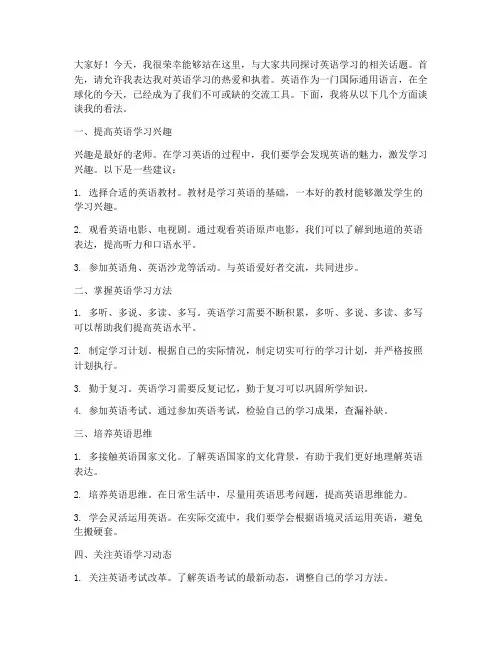
大家好!今天,我很荣幸能够站在这里,与大家共同探讨英语学习的相关话题。
首先,请允许我表达我对英语学习的热爱和执着。
英语作为一门国际通用语言,在全球化的今天,已经成为了我们不可或缺的交流工具。
下面,我将从以下几个方面谈谈我的看法。
一、提高英语学习兴趣兴趣是最好的老师。
在学习英语的过程中,我们要学会发现英语的魅力,激发学习兴趣。
以下是一些建议:1. 选择合适的英语教材。
教材是学习英语的基础,一本好的教材能够激发学生的学习兴趣。
2. 观看英语电影、电视剧。
通过观看英语原声电影,我们可以了解到地道的英语表达,提高听力和口语水平。
3. 参加英语角、英语沙龙等活动。
与英语爱好者交流,共同进步。
二、掌握英语学习方法1. 多听、多说、多读、多写。
英语学习需要不断积累,多听、多说、多读、多写可以帮助我们提高英语水平。
2. 制定学习计划。
根据自己的实际情况,制定切实可行的学习计划,并严格按照计划执行。
3. 勤于复习。
英语学习需要反复记忆,勤于复习可以巩固所学知识。
4. 参加英语考试。
通过参加英语考试,检验自己的学习成果,查漏补缺。
三、培养英语思维1. 多接触英语国家文化。
了解英语国家的文化背景,有助于我们更好地理解英语表达。
2. 培养英语思维。
在日常生活中,尽量用英语思考问题,提高英语思维能力。
3. 学会灵活运用英语。
在实际交流中,我们要学会根据语境灵活运用英语,避免生搬硬套。
四、关注英语学习动态1. 关注英语考试改革。
了解英语考试的最新动态,调整自己的学习方法。
2. 关注英语学习资源。
利用网络、书籍等资源,丰富自己的英语知识。
总之,英语学习需要我们付出努力,坚持不懈。
希望我们能够共同探讨英语学习的奥秘,提高自己的英语水平。
最后,祝愿大家在英语学习的道路上越走越远,取得优异的成绩!谢谢大家!。
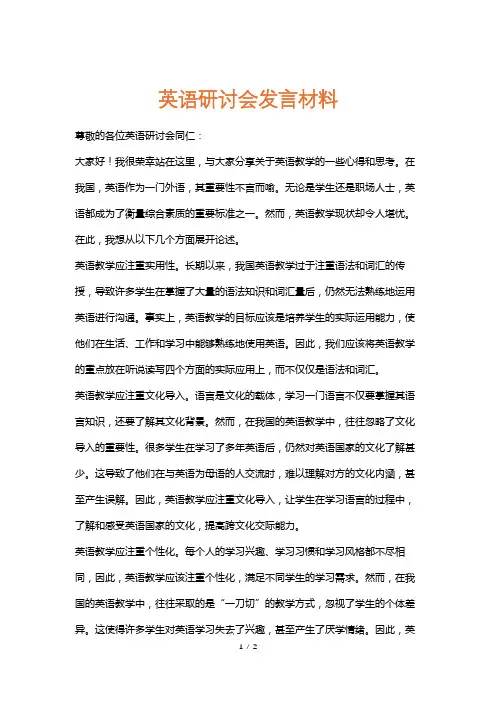
英语研讨会发言材料尊敬的各位英语研讨会同仁:大家好!我很荣幸站在这里,与大家分享关于英语教学的一些心得和思考。
在我国,英语作为一门外语,其重要性不言而喻。
无论是学生还是职场人士,英语都成为了衡量综合素质的重要标准之一。
然而,英语教学现状却令人堪忧。
在此,我想从以下几个方面展开论述。
英语教学应注重实用性。
长期以来,我国英语教学过于注重语法和词汇的传授,导致许多学生在掌握了大量的语法知识和词汇量后,仍然无法熟练地运用英语进行沟通。
事实上,英语教学的目标应该是培养学生的实际运用能力,使他们在生活、工作和学习中能够熟练地使用英语。
因此,我们应该将英语教学的重点放在听说读写四个方面的实际应用上,而不仅仅是语法和词汇。
英语教学应注重文化导入。
语言是文化的载体,学习一门语言不仅要掌握其语言知识,还要了解其文化背景。
然而,在我国的英语教学中,往往忽略了文化导入的重要性。
很多学生在学习了多年英语后,仍然对英语国家的文化了解甚少。
这导致了他们在与英语为母语的人交流时,难以理解对方的文化内涵,甚至产生误解。
因此,英语教学应注重文化导入,让学生在学习语言的过程中,了解和感受英语国家的文化,提高跨文化交际能力。
英语教学应注重个性化。
每个人的学习兴趣、学习习惯和学习风格都不尽相同,因此,英语教学应该注重个性化,满足不同学生的学习需求。
然而,在我国的英语教学中,往往采取的是“一刀切”的教学方式,忽视了学生的个体差异。
这使得许多学生对英语学习失去了兴趣,甚至产生了厌学情绪。
因此,英语教学应注重个性化,尊重学生的学习兴趣和特点,激发他们的学习积极性。
英语教学应注重评价方式的多元化。
长期以来,我国英语教学评价主要依赖于考试成绩,这种单一的评价方式使得许多学生将英语学习视为负担,片面追求分数,忽视了英语实际应用能力的培养。
事实上,英语教学评价应该多元化,既要关注学生的语言知识掌握程度,也要关注他们的语言运用能力、学习过程和情感态度。
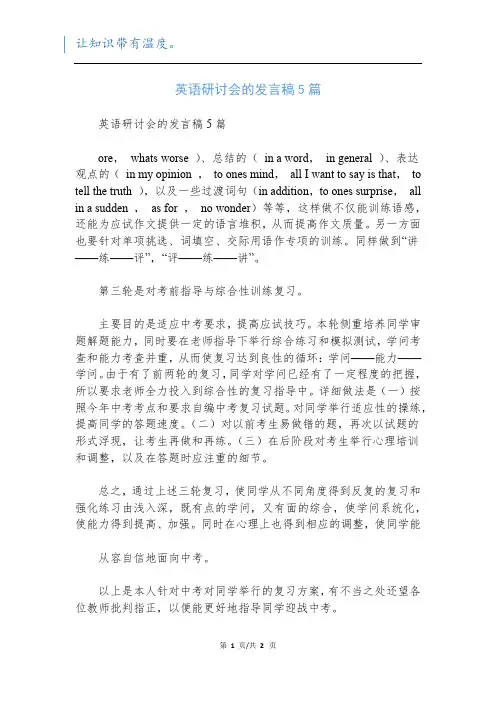
让知识带有温度。
英语研讨会的发言稿5篇英语研讨会的发言稿5篇ore,whats worse )、总结的(in a word,in general )、表达观点的(in my opinion ,to ones mind,all I want to say is that,to tell the truth ),以及一些过渡词句(in addition,to ones surprise,all in a sudden ,as for ,no wonder)等等,这样做不仅能训练语感,还能为应试作文提供一定的语言堆积,从而提高作文质量。
另一方面也要针对单项挑选、词填空、交际用语作专项的训练。
同样做到“讲——练——评”,“评——练——讲”。
第三轮是对考前指导与综合性训练复习。
主要目的是适应中考要求,提高应试技巧。
本轮侧重培养同学审题解题能力,同时要在老师指导下举行综合练习和模拟测试,学问考查和能力考查并重,从而使复习达到良性的循环:学问——能力——学问。
由于有了前两轮的复习,同学对学问已经有了一定程度的把握,所以要求老师全力投入到综合性的复习指导中。
详细做法是(一)按照今年中考考点和要求自编中考复习试题。
对同学举行适应性的操练,提高同学的答题速度。
(二)对以前考生易做错的题,再次以试题的形式浮现,让考生再做和再练。
(三)在后阶段对考生举行心理培训和调整,以及在答题时应注重的细节。
总之,通过上述三轮复习,使同学从不同角度得到反复的复习和强化练习由浅入深,既有点的学问,又有面的综合,使学问系统化,使能力得到提高、加强。
同时在心理上也得到相应的调整,使同学能从容自信地面向中考。
以上是本人针对中考对同学举行的复习方案,有不当之处还望各位教师批判指正,以便能更好地指导同学迎战中考。
第1页/共2页千里之行,始于足下英语研讨会的发言稿篇4恭敬的各位领导、教师们:大家上午好!很兴奋能够参与这次研讨会,谢谢教研室领导为我们提供这次与各位教师学习沟通的机会。

中考英语研讨会交流材料中考英语研讨会交流材料尊敬的各位专家、教师们:大家好!我很荣幸能够在本次中考英语研讨会上与各位交流英语教学的经验和方法。
今天,我想从听力、阅读和写作三个方面谈一下我个人的观点。
首先是听力方面,我认为提高中考英语听力的关键是培养学生的听力技巧和听力策略。
我们可以通过多听多说的方式来提高学生的听力水平。
比如,我们可以组织学生进行听力竞赛,让他们通过不断地听和回答问题来提高听力技巧。
此外,我们还可以给学生提供一些听力策略,如预测、推理和分析等,这样能够帮助学生更好地理解听力材料。
其次是阅读方面,我认为培养学生的阅读习惯和阅读技巧是提高中考英语阅读能力的关键。
我们可以通过设置一些阅读目标和阅读任务来引导学生培养阅读习惯。
比如,我们可以给学生定期布置一些有趣的阅读材料,让他们阅读并写读后感。
此外,我们还可以教给学生一些阅读技巧,如寻找关键词、注意信息连接和推理等,这样能够帮助学生更好地理解阅读材料。
最后是写作方面,我认为提高中考英语写作能力的关键是培养学生的写作意识和写作技巧。
我们可以通过带领学生写作范文、进行写作讨论和批改写作作业等方式来培养学生的写作意识。
比如,我们可以给学生提供一些写作模板和写作例句,让他们参考并仿写,从而提高写作水平。
此外,我们还可以教给学生一些写作技巧,如构思、组织、写作结构和语法等,这样能够帮助学生更好地提升写作能力。
总的来说,提高中考英语听力、阅读和写作能力的关键是培养学生的听力技巧和策略、阅读习惯和技巧、写作意识和技巧。
我们可以通过多听多说、设置阅读目标和任务、提供写作范文和例句等方式来帮助学生提高英语水平。
同时,我们也要密切关注学生的学习情况,并根据他们的实际情况进行个性化的辅导和指导,使每个学生都能够取得进步。
谢谢大家!。
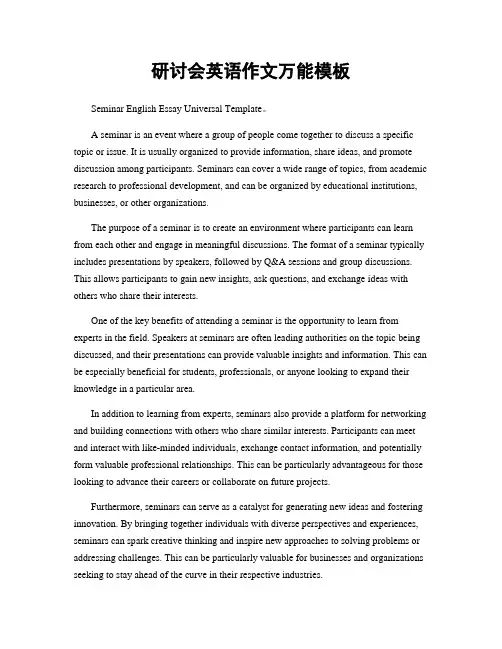
研讨会英语作文万能模板Seminar English Essay Universal Template。
A seminar is an event where a group of people come together to discuss a specific topic or issue. It is usually organized to provide information, share ideas, and promote discussion among participants. Seminars can cover a wide range of topics, from academic research to professional development, and can be organized by educational institutions, businesses, or other organizations.The purpose of a seminar is to create an environment where participants can learn from each other and engage in meaningful discussions. The format of a seminar typically includes presentations by speakers, followed by Q&A sessions and group discussions. This allows participants to gain new insights, ask questions, and exchange ideas with others who share their interests.One of the key benefits of attending a seminar is the opportunity to learn from experts in the field. Speakers at seminars are often leading authorities on the topic being discussed, and their presentations can provide valuable insights and information. This can be especially beneficial for students, professionals, or anyone looking to expand their knowledge in a particular area.In addition to learning from experts, seminars also provide a platform for networking and building connections with others who share similar interests. Participants can meet and interact with like-minded individuals, exchange contact information, and potentially form valuable professional relationships. This can be particularly advantageous for those looking to advance their careers or collaborate on future projects.Furthermore, seminars can serve as a catalyst for generating new ideas and fostering innovation. By bringing together individuals with diverse perspectives and experiences, seminars can spark creative thinking and inspire new approaches to solving problems or addressing challenges. This can be particularly valuable for businesses and organizations seeking to stay ahead of the curve in their respective industries.Another important aspect of seminars is the opportunity for personal and professional development. Participants can gain new skills, knowledge, and insights that can help them advance in their careers or academic pursuits. Seminars often include workshops or training sessions that provide practical, hands-on experience and guidance, allowing participants to apply what they have learned in a real-world context.In conclusion, seminars are an invaluable platform for learning, networking, and professional development. Whether it's for academic enrichment, career advancement, or simply expanding one's horizons, seminars offer a wealth of opportunities for personal and intellectual growth. By attending seminars, participants can gain new knowledge, connect with others in their field, and contribute to the exchange of ideas and innovation. As such, seminars play a crucial role in fostering a culture of learning and collaboration in various domains.。
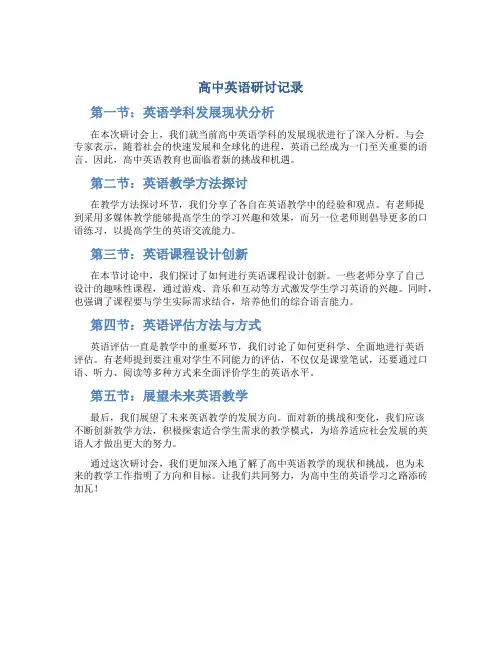
高中英语研讨记录
第一节:英语学科发展现状分析
在本次研讨会上,我们就当前高中英语学科的发展现状进行了深入分析。
与会
专家表示,随着社会的快速发展和全球化的进程,英语已经成为一门至关重要的语言。
因此,高中英语教育也面临着新的挑战和机遇。
第二节:英语教学方法探讨
在教学方法探讨环节,我们分享了各自在英语教学中的经验和观点。
有老师提
到采用多媒体教学能够提高学生的学习兴趣和效果,而另一位老师则倡导更多的口语练习,以提高学生的英语交流能力。
第三节:英语课程设计创新
在本节讨论中,我们探讨了如何进行英语课程设计创新。
一些老师分享了自己
设计的趣味性课程,通过游戏、音乐和互动等方式激发学生学习英语的兴趣。
同时,也强调了课程要与学生实际需求结合,培养他们的综合语言能力。
第四节:英语评估方法与方式
英语评估一直是教学中的重要环节,我们讨论了如何更科学、全面地进行英语
评估。
有老师提到要注重对学生不同能力的评估,不仅仅是课堂笔试,还要通过口语、听力、阅读等多种方式来全面评价学生的英语水平。
第五节:展望未来英语教学
最后,我们展望了未来英语教学的发展方向。
面对新的挑战和变化,我们应该
不断创新教学方法,积极探索适合学生需求的教学模式,为培养适应社会发展的英语人才做出更大的努力。
通过这次研讨会,我们更加深入地了解了高中英语教学的现状和挑战,也为未
来的教学工作指明了方向和目标。
让我们共同努力,为高中生的英语学习之路添砖加瓦!。
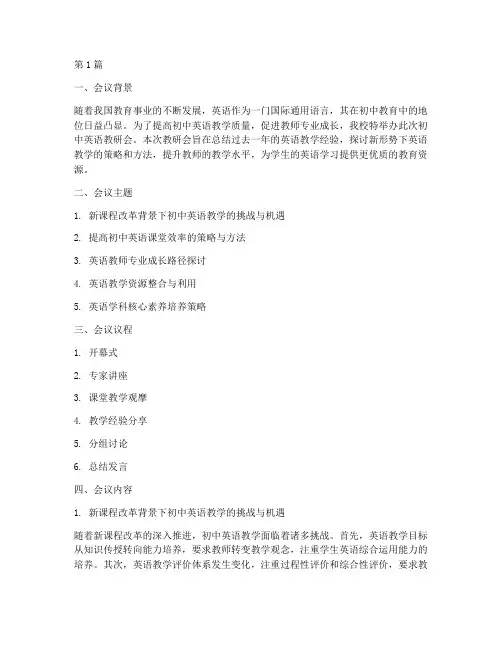
第1篇一、会议背景随着我国教育事业的不断发展,英语作为一门国际通用语言,其在初中教育中的地位日益凸显。
为了提高初中英语教学质量,促进教师专业成长,我校特举办此次初中英语教研会。
本次教研会旨在总结过去一年的英语教学经验,探讨新形势下英语教学的策略和方法,提升教师的教学水平,为学生的英语学习提供更优质的教育资源。
二、会议主题1. 新课程改革背景下初中英语教学的挑战与机遇2. 提高初中英语课堂效率的策略与方法3. 英语教师专业成长路径探讨4. 英语教学资源整合与利用5. 英语学科核心素养培养策略三、会议议程1. 开幕式2. 专家讲座3. 课堂教学观摩4. 教学经验分享5. 分组讨论6. 总结发言四、会议内容1. 新课程改革背景下初中英语教学的挑战与机遇随着新课程改革的深入推进,初中英语教学面临着诸多挑战。
首先,英语教学目标从知识传授转向能力培养,要求教师转变教学观念,注重学生英语综合运用能力的培养。
其次,英语教学评价体系发生变化,注重过程性评价和综合性评价,要求教师关注学生的全面发展。
此外,多媒体技术的广泛应用为英语教学提供了更多可能性,同时也对教师提出了更高的要求。
机遇方面,新课程改革为英语教学提供了更加广阔的空间。
教师可以结合教学内容,创新教学方法,提高课堂教学效果。
同时,国家加大对英语教育的投入,为英语教学提供了更多优质资源。
2. 提高初中英语课堂效率的策略与方法(1)激发学生学习兴趣:通过创设生动有趣的教学情境,运用多媒体技术,使学生在轻松愉快的氛围中学习英语。
(2)优化课堂教学设计:合理分配教学时间,注重听说读写技能的培养,提高课堂教学效率。
(3)加强课堂互动:鼓励学生积极参与课堂活动,提高学生的参与度和积极性。
(4)关注学生个体差异:针对不同学生的学习特点,采取分层教学,使每个学生都能在课堂上得到充分发展。
(5)运用信息技术:合理运用信息技术,提高英语教学效果。
3. 英语教师专业成长路径探讨(1)加强理论学习:教师应不断学习新的教育理念、教学方法,提高自身理论素养。
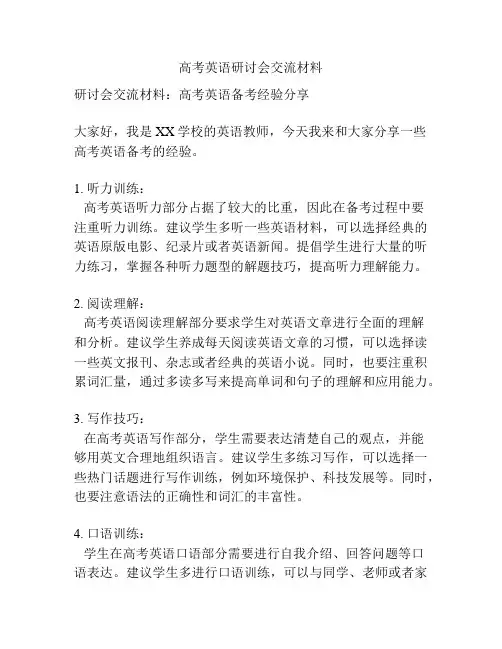
高考英语研讨会交流材料
研讨会交流材料:高考英语备考经验分享
大家好,我是XX学校的英语教师,今天我来和大家分享一些高考英语备考的经验。
1. 听力训练:
高考英语听力部分占据了较大的比重,因此在备考过程中要
注重听力训练。
建议学生多听一些英语材料,可以选择经典的英语原版电影、纪录片或者英语新闻。
提倡学生进行大量的听力练习,掌握各种听力题型的解题技巧,提高听力理解能力。
2. 阅读理解:
高考英语阅读理解部分要求学生对英语文章进行全面的理解
和分析。
建议学生养成每天阅读英语文章的习惯,可以选择读一些英文报刊、杂志或者经典的英语小说。
同时,也要注重积累词汇量,通过多读多写来提高单词和句子的理解和应用能力。
3. 写作技巧:
在高考英语写作部分,学生需要表达清楚自己的观点,并能
够用英文合理地组织语言。
建议学生多练习写作,可以选择一些热门话题进行写作训练,例如环境保护、科技发展等。
同时,也要注意语法的正确性和词汇的丰富性。
4. 口语训练:
学生在高考英语口语部分需要进行自我介绍、回答问题等口
语表达。
建议学生多进行口语训练,可以与同学、老师或者家
人进行英语对话,培养英语口语的流利度和准确性。
以上是我对高考英语备考经验的一些分享,希望对大家有所帮助。
祝愿大家能够在高考中取得优异的成绩!。
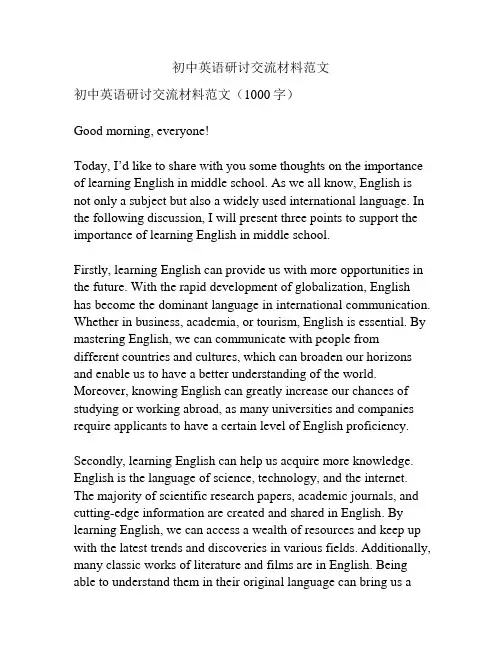
初中英语研讨交流材料范文初中英语研讨交流材料范文(1000字)Good morning, everyone!Today, I’d like to share with you some thoughts on the importance of learning English in middle school. As we all know, English is not only a subject but also a widely used international language. In the following discussion, I will present three points to support the importance of learning English in middle school.Firstly, learning English can provide us with more opportunities in the future. With the rapid development of globalization, English has become the dominant language in international communication. Whether in business, academia, or tourism, English is essential. By mastering English, we can communicate with people from different countries and cultures, which can broaden our horizons and enable us to have a better understanding of the world. Moreover, knowing English can greatly increase our chances of studying or working abroad, as many universities and companies require applicants to have a certain level of English proficiency. Secondly, learning English can help us acquire more knowledge. English is the language of science, technology, and the internet. The majority of scientific research papers, academic journals, and cutting-edge information are created and shared in English. By learning English, we can access a wealth of resources and keep up with the latest trends and discoveries in various fields. Additionally, many classic works of literature and films are in English. Being able to understand them in their original language can bring us adeeper appreciation and enjoyment of cultural masterpieces.Lastly, learning English can enhance our communication skills. English is widely used not only in formal situations, but also in casual conversations and online interactions. By learning English, we can improve our ability to express ideas, share opinions, and engage in meaningful discussions. Communicating in English also promotes critical thinking and problem-solving skills. Moreover, learning English can foster a sense of empathy and understanding towards people who are different from us, as language plays a crucial role in building connections and relationships.In conclusion, learning English in middle school is of great significance. It opens up more opportunities, enables us to acquire more knowledge, and enhances our communication skills. Therefore, it is crucial for us to take English learning seriously and make continuous efforts to improve our language proficiency. Let’s seize every chance to practice English and embrac e the benefits it brings!Thank you for your attention! I look forward to hearing your thoughts and opinions.。
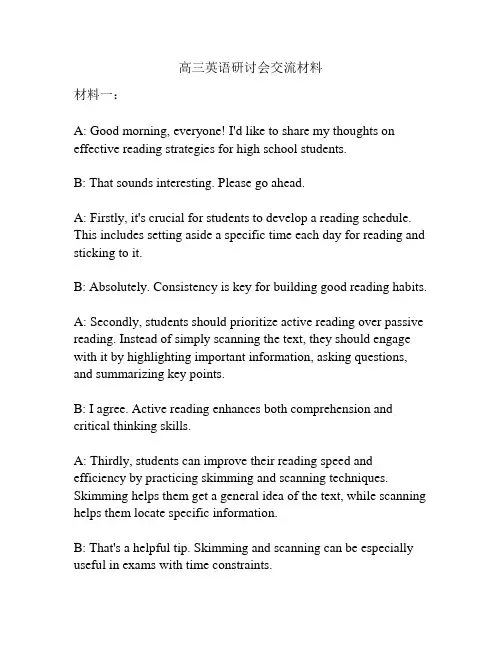
高三英语研讨会交流材料材料一:A: Good morning, everyone! I'd like to share my thoughts on effective reading strategies for high school students.B: That sounds interesting. Please go ahead.A: Firstly, it's crucial for students to develop a reading schedule. This includes setting aside a specific time each day for reading and sticking to it.B: Absolutely. Consistency is key for building good reading habits.A: Secondly, students should prioritize active reading over passive reading. Instead of simply scanning the text, they should engage with it by highlighting important information, asking questions, and summarizing key points.B: I agree. Active reading enhances both comprehension and critical thinking skills.A: Thirdly, students can improve their reading speed and efficiency by practicing skimming and scanning techniques. Skimming helps them get a general idea of the text, while scanning helps them locate specific information.B: That's a helpful tip. Skimming and scanning can be especially useful in exams with time constraints.A: Finally, students should expand their reading materials beyond textbooks. Reading newspapers, magazines, and online articles can broaden their knowledge and improve their language skills.B: I couldn't agree more. Reading diversely exposes students to different writing styles and topics.A: In conclusion, by following these strategies, high school students can become proficient readers, which will greatly benefit their academic and personal development. Thank you.B: Thank you for sharing those valuable insights. I'm sure our students will benefit greatly from implementing these strategies.材料二:A: Good afternoon, everyone! Today, I would like to discuss the importance of effective communication skills for high school students.B: That's an important topic. Please proceed.A: Firstly, it's essential for students to develop good listening skills. This involves paying attention, showing interest, and avoiding distractions when others are speaking.B: You're right. Active listening is the foundation of effective communication.A: Secondly, students should practice clear and concise speaking.They should learn to organize their thoughts, use appropriate vocabulary, and articulate their ideas fluently.B: I couldn't agree more. Being able to express oneself clearly is crucial in various aspects of life.A: Thirdly, students should focus on non-verbal communication. This includes maintaining eye contact, using appropriate facial expressions and body language, and being aware of the impact of gestures.B: Non-verbal cues can sometimes convey more meaning than words themselves. It's important for students to be conscious of these signals.A: Finally, students should improve their writing skills. Effective written communication is necessary for academic success and future career prospects.B: Absolutely. Being able to express ideas coherently and persuasively through writing is a valuable skill.A: In conclusion, by honing their communication skills, high school students can become effective and confident communicators, which will benefit them in both their personal and professional lives. Thank you.B: Thank you for sharing these insights. It's important for us to emphasize the development of communication skills among our students.。
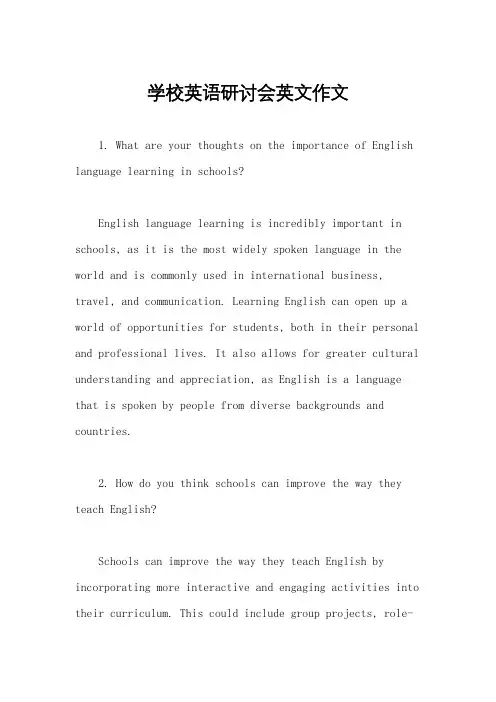
学校英语研讨会英文作文1. What are your thoughts on the importance of English language learning in schools?English language learning is incredibly important in schools, as it is the most widely spoken language in the world and is commonly used in international business, travel, and communication. Learning English can open up a world of opportunities for students, both in their personal and professional lives. It also allows for greater cultural understanding and appreciation, as English is a language that is spoken by people from diverse backgrounds and countries.2. How do you think schools can improve the way they teach English?Schools can improve the way they teach English by incorporating more interactive and engaging activities into their curriculum. This could include group projects, role-playing exercises, and games that encourage students to use English in a practical and meaningful way. Teachers canalso make use of technology, such as online resources and language learning apps, to supplement their lessons and provide students with additional practice and exposure tothe language.3. What challenges do you think students face when learning English, and how can these challenges be addressed?One of the biggest challenges that students face when learning English is the complexity of the language itself, particularly when it comes to grammar and vocabulary. Another challenge is the lack of opportunity to practice speaking and listening outside of the classroom. To address these challenges, teachers can provide students with more opportunities for interactive and conversational learning, such as through language exchange programs or online language learning communities. They can also simplify their lessons and focus on the most essential grammar and vocabulary, while providing students with ample practiceand feedback.4. In your opinion, what role does culture play in English language learning?Culture plays a significant role in English language learning, as language and culture are closely intertwined. Understanding the cultural context of the language can help students better comprehend its nuances and idiomatic expressions. It can also help them develop greater empathy and respect for people from different cultures and backgrounds. Teachers can incorporate cultural elementsinto their lessons, such as through literature, music, and film, to help students develop a deeper appreciation for the language and the people who speak it.5. How can schools encourage students to continue learning English outside of the classroom?Schools can encourage students to continue learning English outside of the classroom by providing them with resources and opportunities to do so. This could include language learning apps, online resources, and languageexchange programs. Teachers can also encourage students to read English-language books and watch English-language media, and provide them with recommendations and guidance on how to improve their language skills. Additionally, schools can organize English language clubs and events, such as debates, public speaking contests, and cultural fairs, to provide students with a platform to practice and showcase their language skills.。
研讨会报告总结英语作文Title: Reflecting on the Seminar: A Summary and Insight.The recent seminar, a gathering of experts and enthusiasts alike, was a testament to the depth and breadth of knowledge within our field. It was an occasion that served as a platform for ideas, a incubator for innovations, and a launchpad for future collaborations. As the dust settles and the echoes of presentations fade, it's worth reflecting on the key takeaways and their potential implications.Firstly, the diversity of perspectives presented was remarkable. From the empirical research of leading academics to the practical insights of industry veterans,the seminar offered a全面的view of our topic. Thisdiversity not only enriched the discussions but also highlighted the need for cross-pollination of ideas across sectors. The学术rigor with which certain presentationswere conducted was complemented by the pragmatic approachof others, creating a harmonious blend of theory and practice.One of the most intriguing discussions centered around the intersection of technology and our field. The advent of new technologies, such as artificial intelligence and machine learning, has opened up new avenues for research and application. The potential of these technologies to revolutionize our understanding and approach to the topic was a recurrent theme throughout the seminar. However, it was also recognized that the ethical and socialimplications of these technologies cannot be overlooked. This平衡between innovation and responsibility is crucialin ensuring that technology serves humanity, rather than the other way around.Another noteworthy aspect was the emphasis on collaboration and networking. The seminar was not just an exchange of ideas but also an opportunity to build bridges and forge partnerships. The sense of community and camaraderie among participants was palpable, and it was evident that many meaningful connections were made. Thiscollaborative spirit is essential in moving our field forward, as it encourages a shared vision and a collective effort towards achieving common goals.The seminar also underscored the importance of continuous learning and adaptability. In an era where knowledge is constantly evolving, it's crucial to stay abreast of new developments and be willing to adapt our perspectives and approaches. The willingness to embrace change and learn from others was a recurring theme throughout the event, and it was encouraging to see so many participants embracing this mindset.In conclusion, the seminar was a resounding success, not only in terms of the quality and diversity of presentations but also in terms of the spirit of collaboration and learning it instilled. The takeaways from this event are numerous and far-reaching, and it's exciting to imagine the possibilities they unlock for our field. As we move forward, it's important to remember the lessons learned and the connections made at this seminar. Together,we can build on this foundation and take our understanding and application of the topic to new heights.。
英语研讨交流材料范文English Seminar Communication MaterialTitle: The Importance of Effective Communication in the WorkplaceIntroduction:Good communication skills are essential in any workplace environment. It is the key to building strong relationships, fostering teamwork, and achieving organizational goals. This presentation aims to highlight the significance of effective communication, identify common barriers, and provide strategies to overcome them.I. Importance of Effective CommunicationA. Enhances productivity: Clear communication allows employees to understand their roles and responsibilities, reducing errors and maximizing efficiency.B. Promotes teamwork: Effective communication fosters collaboration by encouraging open dialogue and sharing information. It creates a positive work environment where individuals feel valued.C. Builds trust and relationships: Good communication strengthens relationships between colleagues, creating a sense of camaraderie and trust. It enhances employee morale and job satisfaction.D. Effective problem-solving: When communication is clear and concise, problems can be identified and addressed promptly, minimizing their impact on productivity and morale.E. Influences organizational culture: Communication sets the tone for the workplace culture, promoting transparency, respect, andopen-mindedness.II. Common Barriers to Effective CommunicationA. Language barriers: Differences in language proficiency can hinder communication, leading to misunderstandings and confusion. Employers should provide language training and encourage employees to ask for clarification.B. Cultural differences: Varying cultural norms and practices can create barriers to effective communication. Sensitivity training and cultural awareness programs can help overcome these barriers.C. Lack of attention: Distractions such as mobile devices and noisy environments can prevent individuals from actively listening and understanding the intended message. Encouraging active listening techniques can mitigate this barrier.D. Emotional barriers: Negative emotions such as anger, fear, or stress can hinder effective communication. Establishing a supportive work environment and promoting emotional intelligence can help individuals express themselves more effectively.E. Lack of feedback: Without feedback, communication becomes one-sided and ineffective. Encouraging an open feedback culture ensures a two-way flow of information.III. Strategies for Effective CommunicationA. Clear and concise messaging: Using simple language, avoiding jargon, and being direct helps ensure that messages are easily understood. Use visual aids or examples to supplement verbal communication.B. Active listening: Paying attention, maintaining eye contact, and using verbal and non-verbal cues demonstrate active listeningskills. Paraphrasing or summarizing the speaker's message ensures understanding.C. Delivering constructive feedback: Providing feedback in a respectful and constructive manner promotes growth and development. Avoiding personal attacks and focusing on specific behaviors or outcomes is key.D. Utilizing modern communication tools: In today's digital age, utilizing technology such as email, instant messaging, or video conferencing facilitates timely and effective communication across distances.E. Encouraging open communication channels: Creating a supportive environment where employees feel comfortable sharing ideas, concerns, and feedback contributes to effective communication and a positive work culture.Conclusion:Effective communication is essential for a successful workplace environment. By understanding the importance of effective communication, identifying common barriers, and implementing strategies to overcome them, organizations can foster a culture of open dialogue, collaboration, and productivity. Let us strive to communicate effectively and create a thriving workplace for all.。
小学英语研讨交流材料篇一:Hello everyone,Today, I would like to discuss the topic of "Healthy Lifestyle" with all of you.Firstly, let's talk about the importance of a healthy lifestyle. Maintaining a healthy lifestyle is vital for our overall well-being. It helps prevent the risk of various diseases and promotes a longer, happier life. A healthy lifestyle includes a balanced diet, regular exercise, and adequate sleep. It is also essential to avoid harmful habits such as smoking or excessive alcohol consumption.Next, let's discuss some tips for maintaining a healthy lifestyle. Firstly, it is important to have a balanced diet that includes fruits, vegetables, whole grains, lean proteins, and healthy fats. Drinking plenty of water and avoiding sugary drinks is also crucial for our health. Additionally, make sure to engage in regular physical activities such as walking, swimming, or playing sports. Getting enough sleep, usually about 8-9 hours a night, can positively impact our overall health as well.Furthermore, let's talk about the benefits of a healthy lifestyle. A healthy lifestyle can boost our energy levels, improve our mood, and enhance our mental well-being. It can also reduce the risk of chronic diseases such as heart disease, diabetes, and certain types of cancer. Moreover, maintaining a healthy lifestyle can help us maintain a healthy weight and improve our self-confidence.Finally, let's discuss some challenges faced when trying to adopt a healthy lifestyle. Many people find it difficult to break bad habits and establish new healthy ones. Busy schedules, lack of motivation, and limited access to healthy food options or exercise facilities can also be barriers to maintaining a healthy lifestyle. However, with determination and small changes in daily routines, anyone can overcome these challenges and make positive changes towards a healthier lifestyle.In conclusion, maintaining a healthy lifestyle is essential for our physical and mental well-being. By adopting a balanced diet, engaging in regular physical activities, and getting enough sleep, we can improve our overall health and reduce the risk of various diseases. Let's strive to make healthy choices every day and inspire others to do the same. Thank you for your attention.篇二:Hello everyone,Today, let's discuss the topic of "Environmental Protection" together.Firstly, let's talk about the importance of environmental protection. Our environment provides us with vital resources such as clean air, water, and food. It is crucial that we protect these resources to ensure a sustainable future for ourselves and future generations. Environmental protection is not only about conserving natural resources but also about preserving biodiversity and preventing pollution.Next, let's discuss some ways we can contribute to environmental protection. Firstly, we can reduce, reuse, and recycle. By reducing our consumption of resources, reusing items instead of throwing them away, and recycling waste materials, we can reduce the amount of waste that ends up in landfills and conserve resources. Additionally, we can save energy by using energy-efficient appliances, turning off lights when not in use, and reducing water consumption.Furthermore, let's talk about the benefits of environmental protection. When we protect the environment, we are also protecting our own health. By reducing pollution and preserving natural habitats, we can ensure cleaner air, water, and food sources. Environmental protection also helps maintain the balance of ecosystems, which in turn supports biodiversity and provides us with various ecosystem services.Finally, let's discuss some challenges we face in environmental protection. One major challenge is raising awareness and changing attitudes towards environmental issues. Many people are still unaware of the impact their actions have on the environment and may not prioritize environmental protection in their daily lives. Additionally, economic factors and competing interests can sometimes hinder efforts for environmental protection. However, through education, advocacy, and collective action, we can overcome these challenges and work towards a greener future.In conclusion, environmental protection is crucial for our well-being and the well-being of our planet. By reducing waste,conserving resources, and taking small steps in our daily lives, we can contribute to a healthier environment. Let's all strive to be responsible stewards of our planet and inspire others to join in the efforts of environmental protection. Thank you for your attention.。
初中英语研讨交流材料中学英语研讨交流材料标题:Creating an Effective English Learning Environment in Middle SchoolsIntroduction:Good morning everyone! Thank you for joining us in this discussion on creating an effective English learning environment in middle schools. Today, we will explore various strategies and methods that can be implemented to enhance English language learning for our students. Let's get started!1. Use of Authentic Materials:One way to create an effective English learning environment is by using authentic materials. These materials can include real-life examples, such as newspaper articles, songs, movies, or even advertisements. By exposing students to English in its natural context, they can develop a better understanding of how the language is used in real-life situations.2. Integration of Technology:Another important aspect of creating an effective English learning environment involves the integration of technology. Utilizing various online resources, such as educational apps, interactive websites, or language learning platforms, can greatly enhance the learning experience for students. Additionally, technology can provide opportunities for students to practice their listening and speaking skills through activities such as online discussions orvirtual language exchanges.3. Encourage Active Participation:Creating an environment where students feel comfortable actively participating in English class is crucial. Teachers should provide opportunities for group work, discussions, presentations, and debates to encourage students to use English in a meaningful and interactive way. By actively engaging in class activities, students can enhance their language skills and build their confidence when speaking English.4. Promote the Use of English Outside the Classroom:English language learning should not be limited to the classroom. Encouraging students to use English outside of school can greatly contribute to their language development. Schools can organize language clubs, language exchange programs, or even English-speaking competitions to provide students with opportunities to practice their English in real-life situations.5. Incorporate Fun and Creative Activities:Integrating fun and creative activities into English lessons can make the learning experience more enjoyable and memorable for students. For instance, teachers can organize English drama clubs, storytelling sessions, or role-plays. By incorporating these activities, students can not only improve their language skills but also develop their creativity and critical thinking abilities. Conclusion:Creating an effective English learning environment in middle schools is crucial for the overall language development of ourstudents. By using authentic materials, integrating technology, encouraging active participation, promoting the use of English outside the classroom, and incorporating fun and creative activities, we can enhance the learning experience and motivation of our students. Let's continue to explore and implement these strategies, and ultimately help our students become confident and proficient English speakers. Thank you all for your active participation!。
第1篇一、研讨背景随着我国教育改革的不断深入,英语教育作为基础学科之一,越来越受到重视。
为了提高初中英语教学质量,促进教师专业成长,我校初中英语教研组定期组织研讨活动。
本次研讨活动旨在探讨如何优化教学策略,提高学生英语学习兴趣,提升英语教学效果。
二、研讨主题1. 新课程理念下初中英语教学策略研究2. 提高学生英语学习兴趣的有效途径3. 英语课堂活动设计与实施4. 教师专业素养提升策略三、研讨内容(一)新课程理念下初中英语教学策略研究1. 转变教学观念:以学生为中心,关注学生个体差异,尊重学生的主体地位。
2. 改革教学方法:倡导启发式、探究式、讨论式、合作式等教学方法,激发学生学习兴趣。
3. 优化教学内容:结合教材,拓展课外资源,丰富教学内容,提高学生的综合运用能力。
4. 强化评价机制:采用多元化评价方式,关注学生学习过程,促进学生全面发展。
(二)提高学生英语学习兴趣的有效途径1. 创设情境:利用多媒体、实物、图片等手段,为学生创设生动、有趣的英语学习情境。
2. 激发兴趣:结合学生兴趣,开展丰富多彩的英语活动,如英语角、英语歌曲比赛等。
3. 培养自主学习能力:引导学生制定学习计划,培养良好的学习习惯,提高自主学习能力。
4. 家校合作:加强家校沟通,共同关注学生英语学习,形成教育合力。
(三)英语课堂活动设计与实施1. 活动设计原则:遵循趣味性、实践性、互动性、层次性原则,确保活动有效开展。
2. 活动类型:口语活动、听力活动、阅读活动、写作活动等。
3. 活动实施:教师应根据教学内容和学情,灵活运用各种活动,提高课堂效率。
(四)教师专业素养提升策略1. 深入学习教育理论,更新教育观念,提高教育教学水平。
2. 积极参加各类培训,提升自身专业素养。
3. 加强与同行交流,学习先进的教学经验。
4. 关注学生发展,关心学生成长,树立良好的师德形象。
四、研讨成果通过本次研讨,我们取得以下成果:1. 教师对新课程理念下初中英语教学策略有了更深刻的认识。
高考英语研讨会发言稿主题
尊敬的老师们、亲爱的同学们:
《高考英语研讨会》是我们今年学校举办的一项重要活动,旨在帮助同学们更好地应对高考英语考试,提高英语学习的效果。
在这个研讨会上,我们将分享关于高考英语的学习方法、答题技巧,以及备考注意事项。
首先,我想强调的是高考英语学习的重要性。
英语作为一门国际通用语言,在我们日常生活中扮演着越来越重要的角色。
而高考英语成绩的好坏,不仅关乎我们的升学、就业,更关乎我们未来的发展。
因此,我们不能忽视高考英语的学习,我们需要不断提高自己的英语水平,为未来的发展打下坚实的基础。
其次,针对高考英语考试,我们需要掌握一些答题技巧。
比如,阅读理解部分,我们可以通过略读和精读的结合来提高做题速度和准确率;写作部分,我们需要注意修辞手法的运用和句式的多样性。
掌握这些技巧能够帮助我们更好地完成高考英语试卷,提高分数。
最后,备考高考英语需要持之以恒的努力。
学习英语需要不断地积累词汇、提高阅读能力、练习听说能力。
只有在日常的学习中不断积累,才能在高考时得心应手。
因此,我们要始终保持学习的热情和毅力,不断努力,不断提高。
在接下来的研讨会中,我们将会有更多关于高考英语学习的分享和讨论。
希望大家能够认真倾听,积极参与,相信通过我们
的共同努力,一定能够取得优异的成绩。
谢谢大家!以上就是我的发言内容,谢谢大家!。
英语教学研讨会会议材料一、在教学中如何进行教学反思(一)什么是反思?1.所谓‚反思‛,顾名思义可以解释为:‚思考过去的事情,从中总结经验教训‛。
而对于我们教师来说,反思就是教师以自身或他人的教育教学实践活动为思考对象,以现代教育理论为指导,对教育决策、教育行为、教育现象以及由此所产生的结果等进行审视和分析的过程。
2.所谓反思教学,就是观察教师本人在教室里做什么,考虑为什么这样做,以及这样做是否奏效的过程。
也可以说是教师自我观察、自我评价的过程。
反思性教学不仅仅是回忆或回顾已有的教学活动和教学行为,而是要通过教学主体的不断探究、质疑,找到其中的问题和答案,审慎的考虑教学实践并不断矫正不正确的教学行为,合理的进行自我评价,追求教学实践合理性,指导未来的教学行为,使自身的教学具有发展的价值、创造的价值和自我实现的价值,使自我经验型的教师发展成为学者型的教师的过程。
(二)反思的过程、内容和方法1.反思性教学是教师专业发展的特定途径。
科顿和斯巴克斯---兰格于1993年对反思的过程提出了一个教师反思的框架,即:明确问题———收集资料———分析资料———建立理论假设———实施行动五个步骤。
2.反思的内容:①可以说是无所不包的;②凡是与专业教学有关的内容皆可以作反思,如:教学信念、教学策略、实践习惯、课堂管理、学生学习和沟通技巧。
3.反思教学的四个相应阶段:①描述(Describing)②领悟(Informing)(诠释)③正规(Confronting)④改造(Reconstructing)4. 反思教学实施的三个方面:①反思性计划:包括备课和预习两方面;②反思性教学:包括授课和听课两方面;③反思性评价即授课后的情况。
5.反思教学的五个功能:①提升解决教学问题的能力;②拓展专业知识的运用;③推行学习型组织发展;④激励个人及组织发展;⑤缩短理论与实践的距离(espoused theory vs theory-in-practice)。
6.反思教学的方式:西方学者布鲁巴赫(J.W.Bru-bacher)等人提出了四种反思方法供参考:①写反思日记;②观摩和分析;③职业发展;④行动研究。
①反思日记是教师在完成一天的教学工作后对自己教学经验或体会所做的笔记,由其他教师尤其是指导教师共同进行评析。
a. 反思日记写什么?(5个方面)b. 写那些方面?(课程目标方面、学生方面、课堂管理方面、活动和资料方面)②观摩和分析是教师之间的互相听课、评课并互相交换意见。
(包括:听课、评课、录课、录音、学生反馈)③职业发展实际是指教师就教学的问题进行探讨,共同寻找解决方法,并以此指导实践,同时共享有效的教学经验,从而促进整个教师队伍的专业发展。
④行动研究是教师为解决教学中具体的问题而进行的调查研究。
以上这四种反思的方法并非完全独立,由于都具有分析的特性,他们实际上是相互联系的,教师在反思过程中可以综合地加以应用。
(三)反思的态度教师应持什么态度才能把反思教学做得好?有以下三个方面:①开放的态度(Open--mindedness )②有责任感(Responsibility)③全心全意(Whole--heartedness)(四) 反思的作用①反思性教学能促进教师积极主动的探究教学问题。
②反思性教学有助于教师成为研究者。
③反思性教学有利于增强教师的道德感,提高教师的教学水平。
(以上内容可参考课件)二、初中英语教学课堂用语的分类和使用初中和小学有着密切的联系,小学和初中的衔接问题是我们现在应认真考虑的问题。
而初中、小学的课堂用语也相差无几。
课堂教学用语是教师组织课堂教学活动时所使用的语言,是成功课堂教学的保证之一。
教师课堂教学语言的质量在某种意义上是教师基本素质的缩影。
教师在使用课堂教学用语时应注意使用策略,要注意体现‚人本性‛,注重学生的情感因素。
教师的课堂教学用语从教学功能上可分为五大类:1.招呼/问候语 2.提问语 3.反馈语 4.指示/演示语 5.告别语。
1.招呼/问候语教师的课堂教学实际上从其走进教室的那一刻起就开始了。
A good beginning makes a good ending. 一个好的开端对于一堂课来说非常重要。
教师主动、友好地同学生打招呼,不仅可以唤起学生的注意力,使其为开始上课作好准备,还可以创造一个平等、和谐、愉快的学习氛围, 以保证课堂教学的顺利进行。
参考用语:Hi! Good morning/ afternoon.Good morning/afternoon, class./boys and girls.It’s so nice/I’m so happy to see you again.Good , you look great/ wonderful today.How are you doing?How’s it going?You look so happy, any good news?OK, class/ boys and girls , are you ready to have class/begin?(Instead of saying: ‚You‛)May I know your name?(That’s a nice name.)Could you tell me your name, please?(You’ve got a beautiful name. I really like it. ) Shall we begin our lesson now?Let’s start our class, shall we?2.提问语教师在提问时态度和声音要和蔼、可亲。
提问语的使用要注意体现对学生的尊重, 不要让学生感到紧张,有压力。
注意提问语的使用策略可减轻学生的学习焦虑情绪,保护学生的学习积极性。
参考用语:Who’d like to answer the question?Who can answer the question?Who knows the answer?Who’d like to have a try?Would you like to try, Mary?Tim, would you like to have a try?Do you want to try, Lee?Would you like a second try?Would you like someone to help you?Who’d like to help?Who’d like to read the text?Who can spell the word ‚…‛?Can you spell the word ‚…‛?Do you know the Chinese/English of the word…? What’s the English/Chinese for ‚…‛?Any volunteer?Any one/ boy/ girl?Have I made it clear?Is it clear to you?You see the point?Got it? / Did you get it?Are you alright with it?Are you OK with the practice?Have you done/finished your work/exercise yet?3.反馈语反馈语是课堂教学活动的重要组成部分,是教师评价和评估学生课堂表现的重要手段,也是推动教学活动进展的有效方法。
对学生英语学习的评价现在提倡多种方式和多元化。
这其中反馈语是教师对学生课堂表现的一种评价方式。
教师要注意树立评价意识。
不仅要对学生课堂上的学习表现给予评价,对学生情感、态度的表现都应通过评价给予鼓励,达到激励学生的目的。
在使用语言行为评价时教师要注意语气和目光的注视,使学生对老师的表扬和肯定感到真切。
对学生有创意的,创新的思维火花及灵感要及时地、充分地、大大地给与肯定。
不妨使用夸张些的语言。
在语言评价中教师一定要注意语言的使用及使用的策略性。
教师的一句话有可能会影响学生的一生。
如果教师总是说某个学生笨,这个学生有可能就会认为自己不是学习的料,因而放弃努力。
当学生对自己没有信心时,教师的一句鼓励的话,就有可能激励他获得成功。
因此,教师在课堂上一定要注意所使用的语言,要注意体现反馈语的‚人本性‛,注重学生的情感因素。
反馈语可分为肯定式评语、参与式评语和启发式纠错。
(1)肯定式评语教师在使用肯定式评语对学生的课堂表现进行肯定和表扬时,一定要让学生感到老师是在由衷地夸奖他。
要避免敷衍和流于形式。
不要滥用‘Good’。
有的老师过多地单一使用‘Good’评价学生的表现,很难使学生从中受到激励,激发学习的积极性。
参考用语:Not bad. Thank you. (I’m sure you can do better next time.)Good!Thank you. (I could see you’ve practiced a lot.)Good boy/ girl . That’s a good answer. Thank you.Quite good! (I really appreciate your effort.)Very good!(I really enjoy it.)Great! (You did a good job.)Excellent! (Let’s give him/her a big hand!)Wonderful!(I’m so proud of you.)Well done! (Good boy/girl.)Your answer is very good! (I admire your work.)Nice going! (You make a great progress.)对学生有创意的、创新的思维火花及灵感,发言中的闪光点的肯定可以使用以下的用语:What a bright idea! Thank you.That’s a great answer. (I really like it.)You did a good job! (We’re so proud of you!)Good point! (I really enjoy it.)Good job! (I'm very pleased with your work.)Smart! (What an adorable baby!)Clever! (I envy you very much。
)Perfect! (You're very professional.)You are such a smart boy/girl!You got sharp eyes/ears.I couldn’t believe my ears!(2)参与式评语在采用学生之间互相评价的手段时,教师要注意不要拿学生跟别人比,要拿学生同他自己比。